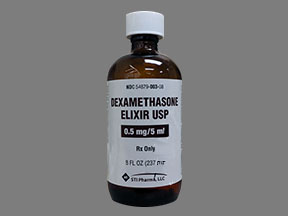
Dexamethasone Coupons & Savings Card – Discount Prices from $24.15
Generic for: Decadron, Dexamethasone intensol, Maxidex
My prescription
Edit
237ML of 0.5MG/5ML, Dexamethasone (1 Bottle)
Select pharmacy

CVS
$28.06
COUPON PRICE
Walgreens
$24.15
COUPON PRICE
Walmart
$24.67
COUPON PRICE
Albertsons
$32.97
COUPON PRICEDexamethasone savings card
Show this card to your pharmacist
Walgreens
$24.15
BIN
ID
PCN
GRP
015995
LHKPV491517
GDC
DR33
Powered by
More prescriptions for ulcerative colitis
More prescriptions for ulcerative colitis
Price history for Dexamethasone Intensol (brand) & Dexamethasone (generic)
1 Bottle, 237ML of 0.5MG/5ML
Average retail price for Dexamethasone Intensol
Average retail price for Dexamethasone
Average SaveHealth price for Dexamethasone
Our price history data is based on aggregated prescription data collected from participating pharmacies in America. Our prescription data updates daily to reflect the latest price changes. If you notice a missing data point, it means there wasn't sufficient data available to generate a monetary value for that date.
We analyzed Dexamethasone prices for (237ML of 0.5MG/5ML, 1 Bottle) over the last 12 months. The average retail price was $78.32, while the average price using the SaveHealth discount card was $32.69. That's a savings of approximately 58.26% when using our Dexamethasone coupon.
Compared to the generic version, Dexamethasone Intensol had an average price of $43.15 over the same time period. With the SaveHealth savings card, Dexamethasone is 24.24% cheaper on average than Dexamethasone Intensol.
*Retail prices are based on pharmacy claims data, and may not be accurate when we don't have enough claims.
Dexamethasone Intensol (Dexamethasone) dosage forms
Dosage Quantity Price from Per unit 1GM 1 Bottle $112.92 $112.92 1GM 2 Bottles $244.82 $122.41 1GM 3 Bottles $376.73 $125.58 100GM 1 Bottle $4815.30 $4815.30 100GM 2 Bottles $9612.30 $4806.15 100GM 3 Bottles $14409.30 $4803.10 237ML of 0.5MG/5ML 1 Bottle $24.67 $24.67 237ML of 0.5MG/5ML 2 Bottles $37.83 $18.91 237ML of 0.5MG/5ML 3 Bottles $47.59 $15.86 240ML of 0.5MG/5ML 1 Bottle $2.00 $2.00
| Dosage | Quantity | Price from | Per unit |
|---|---|---|---|
| 1GM | 1 Bottle | $112.92 | $112.92 |
| 1GM | 2 Bottles | $244.82 | $122.41 |
| 1GM | 3 Bottles | $376.73 | $125.58 |
| 100GM | 1 Bottle | $4815.30 | $4815.30 |
| 100GM | 2 Bottles | $9612.30 | $4806.15 |
| 100GM | 3 Bottles | $14409.30 | $4803.10 |
| 237ML of 0.5MG/5ML | 1 Bottle | $24.67 | $24.67 |
| 237ML of 0.5MG/5ML | 2 Bottles | $37.83 | $18.91 |
| 237ML of 0.5MG/5ML | 3 Bottles | $47.59 | $15.86 |
| 240ML of 0.5MG/5ML | 1 Bottle | $2.00 | $2.00 |
| 240ML of 0.5MG/5ML | 2 Bottles | $11.85 | $5.92 |
| 240ML of 0.5MG/5ML | 3 Bottles | $21.78 | $7.26 |
